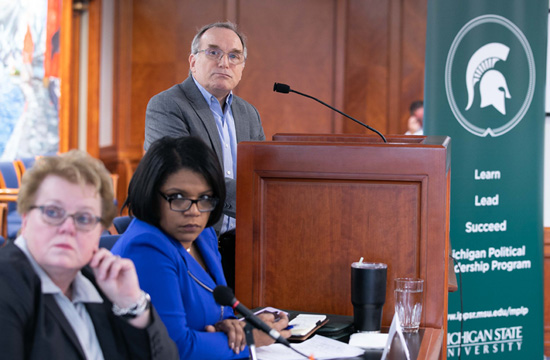The Institute of Public Policy and Social Research held its first policy forum in Lansing for the 2018 fall session on Wednesday, September 19. This forum focused on the recreational marijuana initiative Michigan residents will vote on November 6 as Proposal 1 on the ballot.
Shelly Edgerton of Licensing and Regulatory Affairs (LARA) gave the opening statements regarding the licensing practices of medical marijuana legalization. She says Michigan will have to learn from seasoned states on recreational marijuana implementation. Medical marijuana, which is legal in Michigan, is issued by more than 200 state-licensed dispensaries to 297, 210 patients  Edgerton says and what Michigan has learned from medical marijuana regulation will make it easier for regulation of recreational marijuana to take place.
Edgerton says and what Michigan has learned from medical marijuana regulation will make it easier for regulation of recreational marijuana to take place.
Next to speak was Dr. Jed Magen, Chair of the Michigan State University Department of Psychiatry. His presentation highlighted how marijuana usage affects our brains. Magen shared the transitions to substance abuse like searching for habitual behavior and eventual loss of control over that behavior, “anything that gives you pleasure increases dopamine levels.” Magen then emphasized the differences in our brains from a range of developing ages. More specifically, adolescents and adult brains are very different. Adolescents are impulsive and search for different sensations that can lead to drug use. The problem, Magen shares, is the frontal lobe is not fully developed in adolescence. Periodic use for adults does not typically pose a problem, but problems can happen for people 21 and under because of how the brain changes and develops. Furthermore, we don’t know if marijuana is a gateway drug for any age and we don’t know long-term consequences of marijuana use either.
Dr. Debra Furr-Holden, a C.S Mott Endowed professor of Public Health. Furr-Holden then further highlighted the lack of data and knowledge over the marijuana debate. She says, “as we get good data, we want to implement good policies and be sure they are implemented equitably and fairly.” The problem with recreational marijuana in Michigan is there is no regulation. There are laws governing such things as liquor stores and strip clubs by schools, but there is no regulation with recreational marijuana. Further, we need better innovation and data for drug detection technologies because lots of variables go into drug testing and not all tests are equal. Michigan needs to decide what levels equals impairments for recreational marijuana usage and what test best provides the information we are seeking.
The forum ended with a call to action. Read the full proposal before going to the voting booth. Regardless of November’s outcome, understand that we need more good data as a resource for deciding how to move forward on marijuana use in Michigan.
Hannah Sweeney is an IPPSR Policy Fellow working toward a Masters Degree in Public Policy at Michigan State University.



